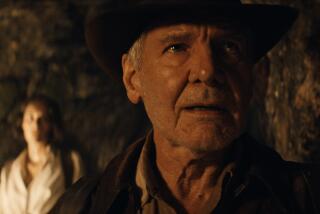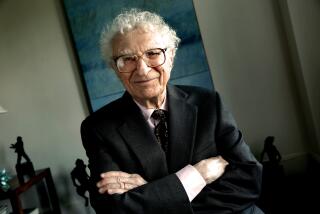Baroness Von Trapp Dies; Inspired ‘Sound of Music’
- Share via
Baroness Maria Augusta von Trapp, the one-time religious novice who led her singing family in an escape from Nazi-occupied Austria that inspired the stage and screen musical “The Sound of Music,” died Saturday night at a hospital in Morrisville, Vt.
The baroness, 82, had undergone surgery for gangrene of the small intenstine Wednesday at Copley Hospital in Morrisville, about 5 miles from the famed Trapp Family Lodge at Stowe.
Johannes von Trapp, youngest of the 10 Trapp children, said his mother’s surgery was not successful and “her heart simply stopped beating” late Saturday afternoon.
He said members of the family would meet this morning to complete funeral arrangements.
Recognized as the guiding force behind the celebrated Trapp Family Singers, known to generations of music lovers through nearly two decades of successful concert touring in the United States, Canada and Europe, it was also the baroness’ decision to allow her family’s story to be made into a stage musical in the late 1950s.
She had refused all previous offers, but finally consented when it was suggested that royalties might be used for her missionary work.
Born Jan. 26, 1905, aboard a train en route to Vienna from her moth er’s home village in the Austrian Tirol, Maria Augusta Kutschera was orphaned at 6 and became the ward of a man she described as a “passionate socialist and violent anti-Catholic” who saw to it that she grew up outside the church.
Coverted to Catholicism at 18, while in her final year at the State Teachers College for Progressive Education in Vienna, she was accepted as a candidate for novitiate at Nonnberg Benedictine Convent in Salzburg.
Later stage and screen portrayals of her in those years, she said, caused her “deep embarrassment.”
No ‘Goody-Goody’
“They showed me as such a goody-goody,” she said. “A kind of errant child. I was nothing of the kind! I was a pest, pure and simple; intractable, obstinate, trouble-making and a totally disruptive factor.
“That poor convent simply couldn’t stand me.
“So they grabbed at the opportunity to send me away--I was teaching fifth-graders at the convent, and teaching them to be problems, too--when it was discovered that Herr Baron von Trapp wanted a teacher for his eldest child, a girl who had been ill of late, and as a kind of super baby-sitter for the others.”
The baron was a much-decorated submarine commander from World War I, who had retired to a family estate at Aigen, near Salzburg, after the death of his wife.
“My heart and my mind,” she said, “were set on the convent and I had no plans other than that. But the children were wonderful, and I loved them from the first. The only problem was the baron himself. I was in awe of him. He really frightened me to death!”
Change in Attitude
As the months passed, she said, her relationship with the children ripened and even her awe of the baron became mitigated by growing understanding.
“There came a day,” she said, “when the little ones, ages 4, 6 and 8, went to their father and said ‘We have found out that in three weeks Maria will go back to the convent, and the only way we can keep her here is if you marry her.’
“The baron laughed and said, ‘I don’t even know if she likes me.’
“I was standing on a stepladder, dusting a chandelier, when these three matchmakers tramped into the room and asked, ‘Do you like our father?’ And I said, ‘Of course,’ without thinking, and they ran from the room and in a minute or two the captain entered.
“He said ‘That was very nice of you,’ and I said, ‘What was?’ and he said the children had told him I would accept his offer of marriage.”
The would-be nun said it left her in a quandary.
Surprise Decision
“I didn’t want to hurt his feelings,” she said, “but I was still awed by him and didn’t want to marry him. So I told him I would have to get the nuns’ permission, knowing there was no chance they would agree.
“But they surprised me. Instead of forbidding the match, they told me it was God’s will!”
The Von Trapps were married in 1927, and the baroness said the nuns were right.
“He was the right husband for me,” she said, “and I think I was the right wife for him. We had three more children--two girls born in Austria and a boy born in the United States--and the relationship was every bit as romantic as the movie and the play made it out to be. But there were a lot of troubles along the way that the play and the film could not show.”
One came in the later 1920s, when economic problems left the baron bankrupt and it became necessary to turn the home into a guest house for students and clergymen.
One of the guests was the Rev. Franz Wasner, an accomplished musician who listened critically to the family’s informal singing (“We always sang together; that much of the play and movie were absolutely true,” the baroness said) and placed himself in charge of their musical education.
Salzburg Appearance
Under Father Wasner’s guidance, the Trapp family began learning the great religious and secular music of the Renaissance and Baroque periods. But there was no thought of appearing professionally until 1936, when they were heard by singer-actress Lotte Lehmann, who insisted that they enter the choral competition of the Salzburg Festival.
They won, and forthwith began their first European tour as the Trapp Family Choir.
On March 13, 1938, Austria was invaded by Nazi Germany, and Father Wasner quietly obtained permission from the Archbishop of Salzburg to accompany the family in escape to Switzerland.
An American concert manager who had heard of them advanced enough money for passage to the United States, and the family arrived in the New York with exactly $4 in assets.
Their first American tour was halted after only a few appearances, but not by any lack of critical or audience reaction.
Cause for Delay
“I was pregnant again,” the baroness said, “with little Johannes.”
The Trapp family gave one final concert at Town Hall in New York, gaining important newspaper publicity and reviews, and then retired for a few months to await the birth.
Their visas expired shortly after Johannes was born and they returned to Europe for a summer tour of Scandinavia.
“But we wanted to live in America,” the baroness said, “and so we came back the next year. Our new tour was not especially successful, but we changed managers and with good advice made the concerts more light-hearted and happy. We changed the name to the Trapp Family Singers, and dressed in native costumes . . . and the audiences seemed to respond better.”
The popularity would continue and increase for another decade, but meanwhile the family was looking for a permanent home--and found it in the Green Mountain countryside of Stowe, Vt., where they built a 20-room Tirolese manor and a chapel, assisted by their neighbors, and subsequently opened a family music camp on a property abandoned by the Civilian Conservation Corps of the 1930s.
Aid for Austria
In 1947, the baroness organized Trapp Family Austrian Relief, an organization dedicated to helping feed and clothe her former countrymen, left homeless and hungry in the aftermath of World War II.
Baron von Trapp died in 1947, and was buried on the family farm, and for a time, the baroness said she thought of “just retiring from life.”
But it was not for long.
“The family wanted to concertize again and I went with them during a European tour in 1950. We even appeared at the Salzburg Festival again and visited our old home. It had been a Nazi headquarters during the war, but now the Society of Precious Blood was using it and that was fine.”
The singers finally disbanded in 1955, due to the maturing and marriage of most of the family, but the family inn continued to operate--it was rebuilt after a fire in 1980--and Maria von Trapp continued the writing career she had begun in 1949 with “The Story of the Trapp Family Singers.”
Books that followed included “Around the Year With the Trapp Family,” “Yesterday, Today and Forever,” and, with Ruth Murdoch, “A Family on Wheels.”
Huge Broadway Success
“The Sound of Music,” with book by Howard Lindsay and Russel Crouse, music and lyrics by Richard Rodgers and Oscar Hammerstein II, opened on Broadway in 1959 with Mary Martin and Theodore Bikel in the leading roles, and became one of the biggest moneymakers in the history of American theater.
The original production ran for more than three years, a revival was staged in 1967 and the 1965 film version, starring Julie Andrews and Christopher Plummer, is still showing and making money all over the world.
Several of its songs--”Climb Every Mountain,” “My Favorite Things” and the title song--have become classics.
But the baroness told an interviewer that she was “very nervous” in the months preceding the movie.
“But when I finally saw the film” she said, “I was so relieved that I loved it dearly. The first 10 minutes--the hills and the singing--I would like to see every morning for breakfast.”
More to Read
The biggest entertainment stories
Get our big stories about Hollywood, film, television, music, arts, culture and more right in your inbox as soon as they publish.
You may occasionally receive promotional content from the Los Angeles Times.










